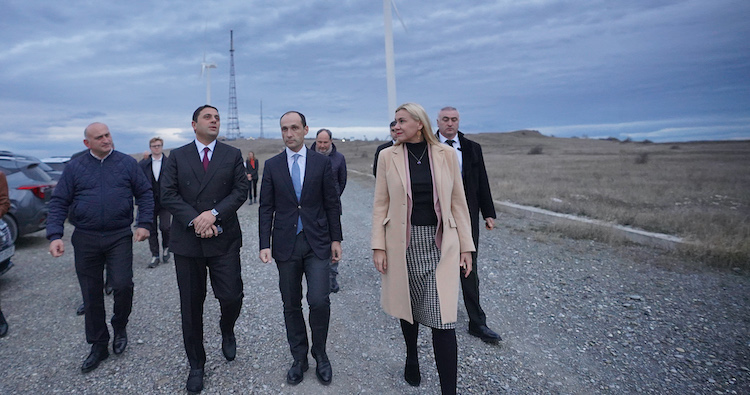Georgia, EU hold first High-Level Energy Dialogue in Tbilisi

Economy Minister Levan Davitashvili and and Kadri Simson, the European Commissioner for Energy visited the Kartli wind power station in central Georgia's Shida Kartli region. Photo: Ministry of Economy
Georgian Economy Minister Levan Davitashvili and Kadri Simson, the European Commissioner for Energy on Thursday held the first EU-Georgia High-Level Energy Dialogue in the Georgian capital city of Tbilisi following the last week European Commission recommendation to grant Georgia the EU membership candidate status.
The Ministry of Economy cited Davitashvili as saying the Dialogue format would become “regular” and “annual”.
The meeting focused on Georgia's alignment with key EU energy legislation, development of energy infrastructure and connectivity, and promotion of energy efficiency and renewable energy.
Gamarjoba, Georgia????????!
— Kadri Simson (@KadriSimson) November 16, 2023
One week ago, the @EU_Commission recommended to grant #Georgia the status of candidate to join the #EU.
Today, we held the first EU????????-????????Georgia High-Level Energy Dialogue, to enhance even further our good co-operation in the #energy sector. pic.twitter.com/SwiIF8Kz52
Davitashvili noted during the discussions that Georgia was starting a “new path” in the process of European integration, while highlighting “significant progress” the country had made in its energy market reforms and in implementation of EU rules.
However, in addition to the achieved progress, we also have many important energy reforms that still need to be implemented with the support of the EU. Georgia has the greatest potential in renewable energies, and we feel the support of Europe and European financial institutions in the way of effectively using and utilising this potential", he said.
The Minister said the Georgian legislation was “already in compliance” with European requirements and standards.
We have introduced a new energy efficiency labelling system. We are working towards market liberalisation. We are also working on institutional arrangement and improvement, where transmission and generation functions will be clearly separated, and this will create fairer rules in the energy system”, Davitashvili said.
The Dialogue also focused on funding instruments and attracting investments in Georgia’s energy infrastructure and its energy transition.
The Ministry of Economy announced Davitashvili on Friday also hosted Simson at the Kartli wind power station in central Georgia's Shida Kartli region. The officials said the project was an example of “successful cooperation” between Georgia and the EU in the renewable energy sector.
The first project of its kind in the South Caucasus region, the power plant project was implemented with the financial support of the EU in 2016 with a capacity of 20.7 MW and production of 84.1 million KW/h.
The Ministry cited Simson as saying it was “important and necessary” to invest in the renewable energy sector of Georgia, in particular in wind and solar power plants, so that electricity trade could be carried out “smoothly throughout the year”.
The next High-Level Energy Dialogue is scheduled to be held in Brussels, Belgium, the body added.
 Tweet
Tweet  Share
Share